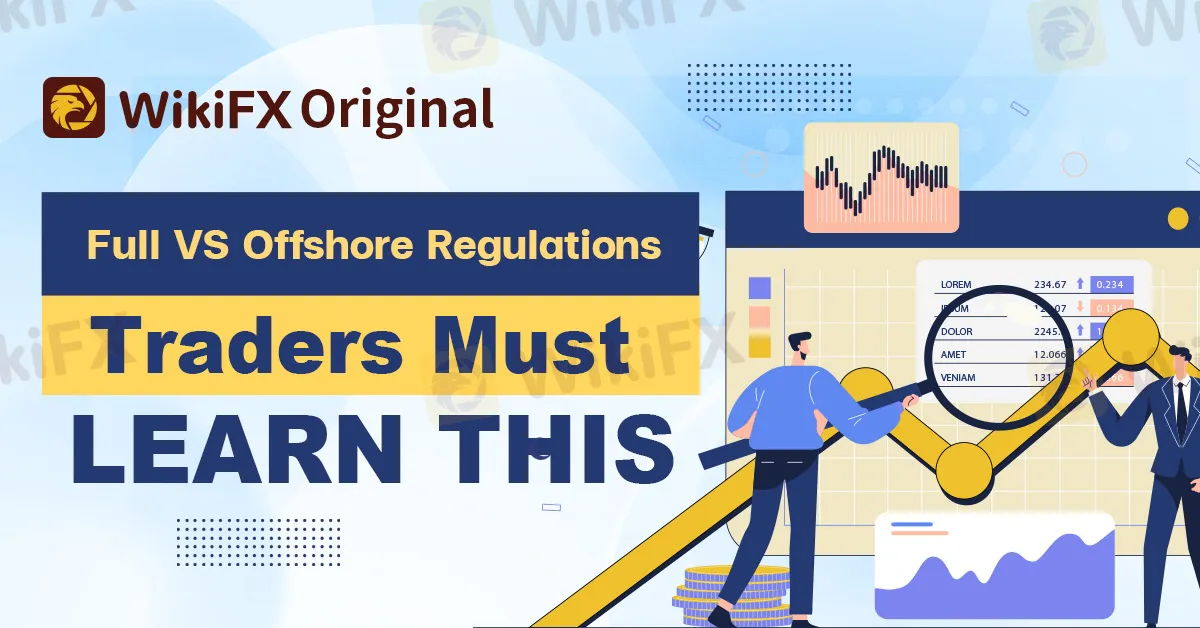简体中文
繁體中文
English
Pусский
日本語
ภาษาไทย
Tiếng Việt
Bahasa Indonesia
Español
हिन्दी
Filippiiniläinen
Français
Deutsch
Português
Türkçe
한국어
العربية
Full VS Offshore Regulations | Traders Must Learn This
Abstract:Discover the differences between full regulation and offshore regulation in the financial sector and learn how WikiFX empowers traders with essential regulatory insights to make informed decisions in the complex financial market landscape.

In the ever-evolving financial sector, understanding the different types of regulations is crucial for traders and investors seeking a safe and reliable trading environment. Regulations can be broadly categorized into two types: full regulation and offshore regulation, each with its own set of advantages and considerations.

When operating under full regulation, financial entities face stricter rules on license issuance and management. This can provide traders with a sense of security, knowing that the regulatory authorities are actively monitoring and supervising the market. Countries like the European Union members, the United Kingdom, the United States, Australia, Hong Kong, Israel, and Russia implement full regulation, making it a prevalent practice in many established financial markets.
However, with the benefits of comprehensive oversight come more extensive requirements and higher costs. Full regulation often involves substantial management fees, including application fees, activation fees, and annual fees. Moreover, entities operating within these jurisdictions are subject to minimum capital requirements to ensure financial stability. The process of obtaining licenses can be intricate, involving extensive due diligence and suitability procedures for companies, directors, and shareholders.

On the other hand, offshore regulation provides an alternative for traders seeking a more flexible and cost-effective approach. Obtaining an offshore license is generally faster, taking only a few months in most cases, depending on the regulatory jurisdiction. The operational costs and management fees tend to be lower, making it an attractive option for those seeking more accessible entry points into the market.
A key advantage of offshore regulation is the relaxed conditions for obtaining licenses. Many offshore regulatory jurisdictions do not require physical presence for office space, company directors, or shareholders. This can significantly reduce the administrative burden and costs associated with establishing a physical presence in a foreign country.
Moreover, offshore regulation often imposes limited reporting requirements, primarily focusing on capital adequacy and financial conditions. This lighter reporting burden allows entities to operate with greater ease and lower compliance costs. In many offshore jurisdictions, there is no requirement for financial services to be provided exclusively to local residents or within the jurisdiction, providing more flexibility for international operations.

As a prominent platform for traders and investors, WikiFX plays a vital role in enhancing the understanding of regulatory environments worldwide. Its comprehensive database offers insights into the regulatory status of brokers and financial entities, enabling traders to make informed decisions.
By using WikiFX, traders can easily identify whether a broker operates under full regulation or offshore regulation. The platform provides detailed profiles of brokers, including licensing information, regulatory statuses, and any reported issues or complaints. This empowers traders to assess the level of oversight and security offered by a particular broker, helping them navigate the complex financial landscape with confidence.
Additionally, WikiFX serves as a valuable resource for understanding the requirements and implications of different regulatory environments. Whether a trader is considering full regulation or exploring opportunities in offshore jurisdictions, WikiFX's platform equips them with the knowledge needed to weigh the pros and cons effectively.
In conclusion, WikiFX's dedication to providing comprehensive and up-to-date regulatory information is an invaluable asset for traders and investors worldwide. By leveraging its platform, traders can make well-informed choices, enhance risk management, and seize opportunities in the ever-changing financial markets.

Disclaimer:
The views in this article only represent the author's personal views, and do not constitute investment advice on this platform. This platform does not guarantee the accuracy, completeness and timeliness of the information in the article, and will not be liable for any loss caused by the use of or reliance on the information in the article.
Read more

Top 10 Trading Indicators Every Forex Trader Should Know
Master the top 10 Forex trading indicators to analyze real-time Forex quotes, trends, and market signals. Learn strategies to boost accuracy and avoid mistakes.

WikiEXPO Global Expert Interview: Simone Martin—— Exploring Financial Regulation Change
In the midst of financial innovation and regulation, WikiGlobal, the organizer of WikiEXPO, stays abreast of industry trends and conducts a series of insightful and distinctive interviews on pivotal topics. We are delighted to have the privilege of inviting Simone Martin for an in-depth conversation this time.

CySEC Settles Compliance Case with Fxview Operator Charlgate Ltd
Discover how CySEC resolved compliance issues with Charlgate Ltd, the operator of Fxview, through a €50,000 settlement. Explore the investigation, regulatory measures, and CySEC's new website designed for improved accessibility and transparency.

TradingView Launches Liquidity Analysis Tool DEX Screener
Discover TradingView's DEX Screener, a powerful tool for analyzing decentralized exchange trading pairs. Access metrics like liquidity, trading volume, and FDV to make smarter, data-driven trading decisions.
WikiFX Broker
Latest News
Geopolitical Events: What They Are & Their Impact?
Volkswagen agrees deal to avoid Germany plant closures
Top 10 Trading Indicators Every Forex Trader Should Know
TradingView Launches Liquidity Analysis Tool DEX Screener
MultiBank Group Wins Big at Traders Fair Hong Kong 2024
WikiEXPO Global Expert Interview: Simone Martin—— Exploring Financial Regulation Change
'Young investors make investment decisions impulsively to keep up with current trends' FCA Reveals
Why Do You Feel Scared During Trade Execution?
CySEC Settles Compliance Case with Fxview Operator Charlgate Ltd
Malaysian Influencer Detained in Taiwan Over Alleged Role in Fraud Scheme
Currency Calculator


